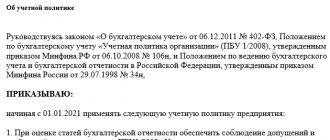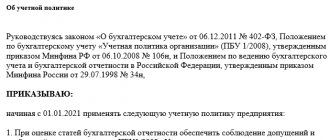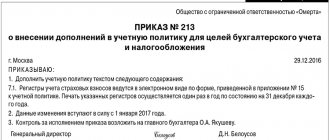Accounting policy under the Unified Agricultural Tax
The accounting policy is an internal regulatory document confirming the status of the company as a payer of the Unified Agricultural Tax. When drawing up the UE, take into account the need to describe the accounting rules for the purpose of taxation of the Unified Agricultural Tax.
What provisions need to be included in accounting policies
The text of the document should be drawn up in the form of separate sections, each of which should disclose provisions regarding the taxation regime, tax calculation, accounting for income and expenses, etc. The table below summarizes the main provisions that need to be included in the document.
| No. | UE section | Description |
| 1 | Tax regime | In the section, write down the tax regime (Unified Agricultural Tax), which is in force on the basis of Federal Tax Service documents. Also indicate the object of taxation (income minus expenses). |
| 2 | Procedure for recording transactions | Specify the document drawn up to record transactions (Book of Income and Expenses), as well as the basis for the entries (primary documents). If you use automated programs to record transactions, then this should also be mentioned in this paragraph. |
| 3 | Accounting procedure | Thus, the basis for taxation of the Unified Agricultural Tax is income minus expenses according to accounting data; the management of an agricultural company should describe the organization of accounting and systematization of data for calculating tax. For example, in this paragraph you can provide the following conditions:
Thus, you should determine the amount of income and expenses for tax purposes based on the indicator reflected in the balance sheet. |
| 4 | List of income and expenses for tax purposes | Describe data on income and expenses involved in calculating the taxable base based on legislative norms. The Tax Code stipulates that agricultural tax payers have the right to take into account the following main types of costs:
Also, as part of the expenses taken into account, you have the right to describe expenses associated with the specifics of agricultural activities, such as expenses for:
If the specifics of your agricultural company’s activities include other expenses within the Tax Code, then they should also be described in this paragraph. |
| 5 | Tax calculation mechanism. Tax payment schedule | Describe the formula for calculating the Unified Agricultural Tax: the difference between income and expenses multiplied by the current tax rate (in 2021 - 6%). Specify the procedure for calculating the annual tax amount and advance payments:
In this paragraph, you can also approve the deadlines for submitting reports to the Federal Tax Service (no later than provided for by current legislation). |
If you acquire land plots to conduct agricultural activities, then the period for recognizing expenses for their acquisition should be reflected in the accounting policy. Please note the following: the legislation determines the period for recognizing land expenses to be at least 7 years.
Example No. 1. Chistoe Pole LLC is engaged in the cultivation and sale of wheat and is a payer of the Unified Agricultural Tax. In February 2017, Chistoe Pole acquired the following land plot from GlavProm JSC:
- land cost 10,402,300 rubles;
- “Clean Field” paid the cost of the land on 02/04/17;
- The land acquisition certificate was signed on 02/18/17;
- 06.17 “Clean Field” received a certificate of ownership of the site.
According to the accounting policies of Chistoe Pole LLC, the period for recognizing expenses for the purchase of land is 8 years. Thus, the amount of monthly expenses will be 108,357 rubles. (RUB 10,402,300 / 8 years * 12 months). “Chistoe Pole” has the right to reflect land expenses from June 2021 (from the moment of registration of ownership).
If you combine the payment of unified agricultural tax and UTII, then you should supplement the text of the accounting policy with the procedure for organizing separate accounting and the mechanism for calculating tax within each of the applied tax regimes.
How to draw up and approve a document
The accounting policy of the unified agricultural tax payer is drawn up in accordance with general requirements.
Accounting policy of the company on the Unified Agricultural Tax
Firms using the Unified Agricultural Tax (as opposed to individual entrepreneurs) are required to keep accounting records, so they need to reflect all the nuances of their accounting and tax accounting in the UE.
They can form a “tax” UP taking into account the recommendations described in the previous section.
IMPORTANT! The rules for the formation of “accounting” accounting policies are defined in PBU 1/2008 “Accounting policies of organizations”, approved by Order of the Ministry of Finance of Russia dated October 6, 2008 No. 106n.
PBU 1/2008 requires firms to include the following aspects in the management program:
- working chart of accounts;
- forms of primary documents;
- regulations and frequency of inventory taking;
- document flow schedule;
- other decisions necessary for organizing accounting.
The “accounting” UP should reflect various accounting issues related to the specifics of the company’s activities.
For example, if its employees go on business trips, the following can be written in the UP:
- organizational regulations for the “travel” procedure;
- daily allowance amount;
- a list of reporting documents upon return from a business trip;
- other “travel” nuances.
In its UP, a company needs not only to reflect accounting nuances, but also to detail reporting features. In particular, if a company uses simplified reporting forms, which is allowed for small businesses, information about the reporting forms used must be reflected in the CP.
Sample accounting policy for an agricultural enterprise
Below is an example of an accounting policy for an agricultural enterprise - a payer of the Unified Agricultural Tax.
Limited Liability Company "Hlebodar"
ORDER No. 143-18/4 on approval of accounting policies for tax purposes
| Krasnodar city | 26.11.2016 |
I ORDER:
- Approve accounting policies for tax purposes.
- Control over the execution of the order is entrusted to the chief accountant G.N. Khvostov.
- The effective date of the accounting policy is 01/01/2017.
Appendix to the order - accounting policy for tax purposes.
G.N. Khvostov was familiarized with the order.
Accounting policies for tax purposes
Tax regime
1. Approve Khlebodar LLC as a payer of the unified agricultural tax (USAT).
Object of taxation
2. To calculate the Unified Agricultural Tax, use the object of taxation, defined as the difference between income received and expenses incurred.
Organization of accounting
3. The tax base for calculating the Unified Agricultural Tax is determined on the basis of data from the Income and Expense Accounting Book, which is maintained automatically using 1C software. Enter data into the Book on the basis of primary documents separately for each transaction. Read also the article: → “Maintaining a book of income and expenses under the unified agricultural tax.”
Accounting for income and expenses
4. For tax purposes, income and expenses should be taken into account on a cash basis (upon the fact of their payment). The increase in the tax base for calculating the Unified Agricultural Tax is carried out at the expense of sales and non-sales income (including advances). The tax base is reduced by:
- costs for purchasing and maintaining the OS;
- costs for the purchase of raw materials, supplies, purchased goods;
- the amount of VAT paid to suppliers;
- expenses for food of workers engaged in agricultural work;
- costs for information and consulting services;
- expenses for participation in tenders and competitions for the purpose of selling products;
- customs duties when exporting agricultural products;
- costs for the acquisition of property rights to land plots.
When calculating the tax, the amount of expenses for the acquisition of land plots should be taken into account in equal parts over 7 years.
Calculation and payment of unified agricultural taxes
5. Before July 15 of the current year, calculate the amount of the advance payment under the Unified Agricultural Tax for the reporting period. Calculation is carried out using the formula:
A = (Exp. – Exp) * 6%,
- where A is the amount of advance payment;
- Dokh – income indicator for the 1st half of the current year according to the Book of Income and Expenses;
- Expense is an indicator of expenses for the 1st half of the current year according to the Income and Expense Accounting Book.
Transfer the calculated advance amount to the budget before July 20 of the current year.
6. Before March 1 of the next year, calculate the amount of the annual payment under the Unified Agricultural Tax for the previous tax period. Calculation is carried out using the formula:
N = (YearExp. – YearExp) * 6%,
- where N is the amount of the annual payment under the Unified Agricultural Tax;
- YearDoh – annual income indicator according to the Income and Expense Book;
- YearExpense is an annual indicator of expenses according to the Income and Expense Book.
The calculated tax amount should be reflected in the declaration. The deadline for filing a declaration with the Federal Tax Service is March 15 of the following year.
7. Before March 20 of the next year, calculate and pay the final amount under the Unified Agricultural Tax for the previous tax period. Determine the amount to be paid using the formula:
P = N – A,
- where P is the final payment under the Unified Agricultural Tax;
- N – annual tax amount;
- A – the amount of the advance paid for the 1st half of the year.
8. Responsibility for compliance with the provisions of the accounting policy is assigned to the chief accountant G.N. Khvostov.
The new year is coming soon, and before it begins, organizations must review the Accounting Policy Order. Moreover, changes in domestic legislation in the field of accounting and taxation contribute to the fact that many organizations can simply radically change and approve a completely new accounting policy. The article is devoted to some aspects of the formation of accounting policies for 2021 in connection with the adoption of amendments to PBU 1/2008 and the Tax Code of the Russian Federation.
Let us briefly recall that by default the organization has the right to supplement or change the accounting policy in the following cases (clause 10 of PBU 1/2008):
be supplemented every time the company introduces new types of activities that have not been carried out before.
It is necessary to change the accounting policy:
— in case of changes in the legislation of the Russian Federation and (or) regulatory legal acts on accounting;
— development by the organization of new methods of accounting. The use of a new method of accounting involves improving the quality of information about the accounting object;
— significant changes in business conditions. A significant change in the business conditions of an organization may be associated with reorganization, change in types of activities, etc.
Changes to the accounting policy must be justified and approved by order or order of the head of the enterprise. Additional approval of changes (for example, by the tax authorities) is not required.
The order must indicate:
— what provisions (points) of accounting or tax policies are changing;
— provide in the order or in an appendix to it the text of the amended or new provision;
- indicate the date from which the changes come into force - if the reason for the changes is related to legislative amendments, then the date will coincide with the day the legislative amendments come into force, in other cases the changes will come into force on January 1 of the year following the year of their approval.
The procedure for forming the accounting policy itself has been somewhat clarified since August 6, 2021, in connection with the entry into force of changes to the Accounting Regulations “Accounting Policy of the Organization” (PBU 1/2008), introduced by Order of the Ministry of Finance of the Russian Federation dated April 28, 2021 No. 69n. As a result, some norms of the Regulations were brought into compliance with Federal Law No. 402-FZ, and the norms of International Financial Reporting Standards (IFRS) were partially introduced. However, there are no global innovations that require mandatory changes in accounting policies in the latest edition of this document.
The algorithm for forming accounting policies has been clarified
PBU No. 1/2008–24/2011 are recognized as federal accounting standards (hereinafter referred to as FSBU). Such changes to 402-FZ were made by Federal Law No. 160-FZ of July 18, 2017, and they are in effect from July 19, 2017.
In paragraph 3 of Art. 8 of Law No. 402-FZ determines that when forming an accounting policy in relation to a specific accounting object, an organization makes a choice from a number of methods allowed by the FSB. In the updated PBU, the term “accounting provisions” is also replaced by the term “FSBU”, and in paragraph 24 of PBU 1/2008, the term “accounting statements” is replaced by the term “accounting (financial) statements”.
Clause 7 of PBU 1/2008 more clearly defines the rules by which a company must choose the method of accounting for a particular object. As before, you need to use the method established by the FBU. If the standards allow several alternative methods, the organization still has the right to choose one of them, taking into account the general requirements (clauses 5, 5.1 and 6 of PBU 1/2008).
If the FSB does not have a single method, in the general case you need to act according to the updated algorithm. Develop your own method, consistently applying first IFRS, then federal and industry standards on similar or related issues, and only then - recommendations in the field of accounting.
In the previous edition of PBU 1/2008, such a sequence was not fixed.
Accounting policies of subsidiaries
According to the new paragraph 5.1 of PBU 1/2008, 2021 edition, each company has the right to choose the accounting option that suits it. As a general rule, the implementation of this right does not depend on the choices made by other organizations.
But there is an exception if:
- The parent organization adopts its own accounting standards.
- It is stated that the subsidiary company is obliged to apply them.
Thus, the subsidiary has a limited choice: only those accounting methods that are reflected in the standards of the parent company are suitable for it.
The criterion of rationality has been expanded
Based on clause 6 of PBU 1/2008, the accounting policy must be rational. That is, when keeping records it is necessary to take into account:
- features of conducting business activities;
- size of the organization.
Due to the latest edition of PBU 1/2008 of 2021, it is also necessary to take into account the cost ratio of collecting information about a specific accounting object and the value of such information.
The procedure for retrospectively reflecting the consequences of changes in accounting policies has been clarified
Another requirement of PBU 1/2008 states that changes in accounting policies that have consequences and are reflected in accounting are retrospective in nature. The new Order of the Ministry of Finance of the Russian Federation introduced some clarifications to this definition:
“Retrospective reflection of the consequences of changes in accounting policies consists of adjusting the opening balance under the item “Retained earnings (uncovered loss)” and (or) other balance sheet items as of the earliest date presented in the accounting (financial) statements, as well as the values of related accounting items, disclosed for each period presented in the financial statements, as if the new accounting policy had been applied from the moment the facts of economic activity of this type arose.”
An obligation to disclose early application of federal accounting standards has been introduced
PBU 1/2008 obliges to indicate the date of entry into force of the accounting standard that is necessarily applied by certain companies. However, the regulatory act allows for the possibility of voluntary application of the standard until its mandatory implementation in the company’s activities. In this case, the company adopts its accounting rules in two stages: first voluntarily, and after the standard comes into force - mandatory.
The obligation to disclose certain facts in reporting has been abolished
Two requirements for disclosure of information in financial statements are excluded from PBU 1/2008.
The first requirement concerns the disclosure of the fact of non-application of a legal document on accounting that has been published but has not yet entered into force, as well as an assessment of the impact of this document on the company’s accounting information generated at the time of its application. Before the new regulations came into force, companies were required to disclose such information in their accounts.
The second requirement relates to the indication of changes made to the accounting policy in the year following the reporting period. Previously, companies were required to disclose this information in their financial statements.
Organizations have the right to unify accounting policies according to IFRS and Russian rules
Now companies have the right to apply International Financial Reporting Standards (IFRS) when developing their accounting policies. True, this innovation concerns only those companies that disclose in their activities:
— consolidated financial statements prepared in accordance with IFRS or
— financial statements prepared in accordance with IFRS, by companies that do not create groups (Part 5, Article 2 of Federal Law No. 208 dated July 27, 2010).
These companies have the right to apply approved accounting standards based on the provisions of IFRS when developing their accounting policies.
The concept of “irrelevant information” was introduced
Information is considered immaterial, the presence, absence or method of reflection of which does not affect the economic decisions of users of these statements. Each company must independently decide what information is immaterial, based on its size and nature (new clause 7.4 of PBU 1/2008).
When generating such information, it is allowed to choose accounting methods, guided only by the requirement of rationality, that is, without the use of standards.
There is no need to write an explanatory note
In the old edition of PBU 1/2008 there was a mention of an explanatory note. It was supposed to be submitted as part of the financial statements and disclose the essential methods of accounting.
The concept of “explanatory note” is not used in the updated PBU 1/2008.
Information about changes in accounting policies and significant methods of accounting still needs to be disclosed, but not in the explanatory note, but in the financial statements. In which document and in what form this information will be disclosed, companies decide for themselves. For example, this could be the text part of the Explanations to the Balance Sheet and the Statement of Financial Results, where the provisions of the corresponding paragraphs should be referenced in the listed forms of financial statements.
Accounting policies for taxation
As for accounting policies for tax purposes, you need to take into account that all changes made to tax legislation related to the activities of your organization and affecting the formation of the tax base must be reflected in the Order.
From 2021, the text of Ch. 25 of the Tax Code of the Russian Federation has been updated once again. Innovations in it that are important for taxation generally do not require decisions about the choice of accounting method. They mainly clarify existing rules and do not apply to every taxpayer.
Major amendments have been made to the procedure for calculating property tax, especially for Unified Agricultural Tax payers. This is a new taxable property despite the fact that you are payers of the Unified Agricultural Tax, and also the possibility of applying benefits in relation to movable property registered after 2012 (clause 25 of Article 381 of the Tax Code of the Russian Federation), which is made dependent on whether it is accepted decision on its establishment in the region (Article 381.1 of the Tax Code of the Russian Federation). These changes are discussed in one of the articles in this issue of the magazine, and the Order must clearly indicate separate accounting of taxable and non-taxable property.
Important changes affected taxation in agricultural organizations using the Unified Agricultural Tax.
The amendments change the current mechanism of the special tax regime for farmers - the single agricultural tax. Now entrepreneurs who operate under this regime are exempt from VAT. With the adoption of the amendments, companies and individual entrepreneurs on the Unified Agricultural Tax will be given a choice - to remain on the single agricultural tax, as now, or to work under the Unified Agricultural Tax + VAT scheme. But agricultural tax payers whose income in 2021 will exceed 100 million rubles will not have such a choice - they will have to pay VAT. In subsequent years, the income level will decrease in increments of 10 million rubles, covering more and more agricultural producers, until it reaches 60 million rubles. by 2022.
We believe that it is advisable for agricultural producers to register information on the procedure for accounting for VAT and property tax, to develop forms of tax registers in the accounting policy for tax purposes, although for VAT this can be done next year, but for property tax already now - for 2018 .
But this is all theory. In practice, we have already developed a standard Order on the accounting policy of an agricultural enterprise for 2021, taking into account changes and additions. You can call and get it, but that doesn't mean you have to take it entirely. It is imperative that you work on it, taking into account all your features and nuances.
Rubric “Question and Answer”
Question No. 1. Farmer LLC is a payer of the Unified Agricultural Tax. In August 2016, “Farmer” acquired ownership of the land, which is sown with agricultural crops (potatoes and onions). The price of land is 9,303,800 rubles. Can the “Farmer” take these expenses into account when calculating the tax? The accounting policy of Farmer LLC stipulates that expenses for the purchase of land are recognized in equal shares over 8.5 years.
The legislation does not prohibit agricultural producers from reducing the tax base by the amount of expenses associated with the purchase of sown land. Therefore, guided by the accounting policy, “Farmer” has the right to reflect monthly expenses in the amount of 91,213 rubles. (9,303,800 rubles / 102 months).
Question No. 2. In December 2021, GlavKhozTrest LLC will approve the accounting policy for 2021. According to the text of the document, expenses for purchased goods reduce the tax base upon the sale of such goods. Are the accounting policies of GlavKhozTrest properly drawn up?
The specified procedure for recognizing expenses contradicts the provisions of the Tax Code, therefore GlavKhozTrest does not have the right to apply it. In this situation, GlavKhozTrest must indicate the following text in the document: “Expenses on purchased goods reduce the tax base upon payment of such goods to the supplier.” It is this provision that GlavKhozTrest should be guided by when recognizing expenses.
Question No. 3. JSC "KhozTorg" combines UTII and Unified Agricultural Tax. The accounting policy of KhozTorg does not contain information on the organization of separate accounting for each of the tax regimes. Is the accounting policy of KhozTorg correctly drawn up?
The accounting policy of KhozTorg is drawn up incorrectly: the document must contain provisions regarding the organization of separate accounting and the procedure for distributing general expenses that relate simultaneously to both tax regimes. Otherwise, the accounting of income and expenses of KhozTorg is kept incorrectly, and as a result, the organization incorrectly calculates the amount of taxes to be paid.
When a peasant farm operates on the Unified Agricultural Tax
Book of income and expenses under the Unified Agricultural Tax
Reporting of peasant farms under the Unified Agricultural Tax: interaction with the Federal Tax Service
Reporting of peasant farms under the Unified Agricultural Tax: reporting forms for extra-budgetary funds
Results
When a peasant farm operates on the Unified Agricultural Tax
A peasant farm is a business entity that currently most closely corresponds to the organizational and legal form of an individual entrepreneur. The fact is that the state registration of a peasant farm involves actually registering the head of the farm as an individual entrepreneur.
At the same time, the legislation of the Russian Federation fundamentally allows for the registration of peasant farms as legal entities (Article 86.1 of the Civil Code of the Russian Federation, paragraph 2 of Article 50 of the Civil Code of the Russian Federation), but at the moment there are no legal mechanisms that allow farmers to work in practice in the appropriate organizational and legal form.
The founders of peasant farms most often enjoy the right to work under the Unified Agricultural Tax, which allows them to pay 6% of the difference between the income and expenses of the farm.
Working for the Unified Agricultural Tax requires farmers to carry out the following basic actions within the framework of reporting procedures:
- provision of reporting documents to the Federal Tax Service;
- provision of reporting forms to extra-budgetary funds;
- maintaining a ledger of income and expenses.
Let's consider their specifics in more detail.
Book of income and expenses under the Unified Agricultural Tax
In accordance with sub. 5 p. 1 art. 23 of the Tax Code of the Russian Federation, as well as clause 8 of Art. 346.5 entrepreneurs on the Unified Agricultural Tax must submit to the Federal Tax Service, at the request of the department, a book of income and expenses. It is usually requested during a desk tax audit. The book must be kept in the form approved in Appendix No. 1 to Order of the Ministry of Finance of the Russian Federation dated December 11, 2006 No. 169n.
A state support program is provided for agricultural producers. Find out whether to include targeted funds in income if you receive a subsidy at a consultation with a ConsultantPlus expert. To do this, register and get trial access for free.
What features of accounting for a merchant’s property on the Unified Agricultural Tax should be reflected in the accounting policy?
The use of the Unified Agricultural Tax is characterized by strict regulation of income and expenses taken into account when calculating agricultural tax. This also applies to accounting subtleties in relation to property used in agricultural activities.
However, even in such strict conditions, certain issues remain that require independent resolution (including reflection in the CP) on the part of the merchant using the Unified Agricultural Tax.
Let us consider, for example, the nuances of how the algorithm for accounting for the cost of land plots is reflected in the UE. The actions of a businessman when purchasing land are regulated by clause 4.1 of Art. 346.5 of the Tax Code of the Russian Federation and provide for taking into account the cost of land in expenses:
- after actual payment of “land” rights;
- if there is a documented fact of filing documents for state registration of the specified right;
- evenly over a certain period (at least 7 years).
The legislator has established a minimum time limit of 7 years, and taking this into account, the agricultural producer prescribes his time period in the UP. It can be equal to either the minimum allowed or any time period exceeding this limit (8, 9, 10 or more years).
In addition to land plots, the UE may reflect the specifics of establishing the useful life of the fixed assets and intangible assets of an agricultural businessman.
This is relevant for the following agricultural producers on the Unified Agricultural Tax:
- switched to the Unified Agricultural Tax from a different tax regime;
- having fixed assets and intangible assets with residual value at the time of transfer.
Since the write-off of the specified property cannot be carried out at a time, but depends on the useful life of fixed assets and intangible assets, it is necessary to establish in the CP the procedure for its determination - if such information is not available in the generally applicable classification (approved by Decree of the Government of the Russian Federation dated January 1, 2002 No. 1).
For a general mechanism for registering an UE, see the material “How to draw up an organization’s accounting policy (2021)?”.
Reporting of peasant farms under the Unified Agricultural Tax: interaction with the Federal Tax Service
NOTE! Due to the introduction of a non-working day regime from March 30 to April 30, 2021, reporting deadlines falling in March-May have been extended by three months. For example, for the Unified Agricultural Tax declaration for 2021, the due date is 06/30/2020 (see Government Resolution No. 409 dated 04/02/2020). Read more about this.
For the Unified Agricultural Tax, the reporting period is six months, and the tax period is a year (clauses 1, 2 of Article 346.7 of the Tax Code of the Russian Federation). At the end of the tax period - before March 31 of the next year (subclause 1, clause 2, Article 346.10 of the Tax Code of the Russian Federation) - a declaration under the Unified Agricultural Tax is submitted to the Federal Tax Service.
In case of termination of the activities of a peasant farm, the declaration under the Unified Agricultural Tax must be submitted to the Federal Tax Service before the 25th day of the month following the month in which the notice of termination of the work of the peasant farm was submitted to the tax service (subclause 2, clause 2, Article 346.10 of the Tax Code of the Russian Federation).
If a peasant farm has employees, then the Federal Tax Service will also need to provide:
- data on the average size of the farm staff for the tax year - until January 20 of the following year;
- unified calculation of insurance premiums - until the 30th day of the month following the reporting quarter;
- 2-NDFL certificates for the tax year - until March 1 of the next year;
- forms 6-NDFL - based on the results of each quarter (for the 1st, 2nd and 3rd quarters - until the last day of the month following the quarter, for the 4th quarter - until April 1 of the next year);
- VAT return – by the 25th day of the month following the reporting quarter.
Taxpayers on the Unified Agricultural Tax have the right to apply exemption from VAT under Art. 145 of the Tax Code of the Russian Federation in compliance with revenue limits. Read more in the material “Unified Agricultural Tax and VAT in 2021”.
If a peasant farm enterprise ceases its activities within which it pays the Unified Agricultural Tax, then within 15 days from the date of its termination it is necessary to send a notification about this to the Federal Tax Service (clause 9 of Article 346.3 of the Tax Code of the Russian Federation).
If a peasant farm employs 10 people or more, then 2-NDFL certificates and 6-NDFL forms are sent to the Federal Tax Service electronically, via the Internet. When a peasant farm employs more than 100 people, then a declaration for the unified agricultural tax, as well as for other taxes, must be sent electronically to the Federal Tax Service, as well as for other taxes, if the peasant farm has the corresponding objects of taxation. The VAT return is always sent electronically, regardless of the number of employees.
Reporting of peasant farms under the Unified Agricultural Tax: reporting forms for extra-budgetary funds
If a peasant farm does not have employees, then its interaction with extra-budgetary funds is carried out in the manner that determines interaction with the corresponding funds of individual entrepreneurs. That is, there is no need to report to the Pension Fund. At the same time, individual entrepreneurs on the Unified Agricultural Tax must pay insurance premiums in a fixed amount.
If a peasant farm has employees, then the farm will have to report:
1. Before the Pension Fund, providing:
- form SZV-M - monthly (until the 15th day of the month following the reporting month);
- form SZV-TD - monthly until the 15th of the previous reporting period.
2. Before the Social Insurance Fund, submitting form 4-FSS to the fund - based on the results of each quarter by the 20th day of the month following the reporting period on paper. If a peasant farm employs more than 25 people, then its reporting to the Social Insurance Fund must be submitted via electronic communication channels. However, it can be submitted 5 days later than the paper version of the report is submitted.
The activities of peasant farms at the unified agricultural system are regulated by a large number of regulations. You can confirm the correctness of what you have written using the materials of the ConsultantPlus system. Get free trial access to the system and watch the explanations of the expert of the NP “Chamber of Tax Consultants” A.V. Anishchenko.
The use of the Unified Agricultural Tax for peasant farms assumes that the farm is a full-fledged business entity and has obligations to submit reports to the Federal Tax Service and extra-budgetary funds. The composition of this reporting depends on whether the peasant farm is an employer.
You can get acquainted with other nuances of conducting activities in the Unified Agricultural Tax regime in the articles:
- “KBK for payment of unified agricultural taxes in 2021”;
- “What is the deadline for paying the Unified Agricultural Tax for the year and what to do in case of a loss.”
You can find more complete information on the topic in ConsultantPlus. Full and free access to the system for 2 days.
Update: December 21, 2021
Taxpayers of the Unified Agricultural Tax (USAT) are organizations and individual entrepreneurs who are agricultural producers and who have switched to paying the Unified Agricultural Tax in the manner established by Chapter. 26.1 of the Tax Code of the Russian Federation (clause 1 of Article 346.2 of the Tax Code of the Russian Federation).
Should UAT payers keep accounting records?
Results
Firms and individual entrepreneurs using the unified agricultural tax system, when drawing up accounting policies, must proceed from the basic requirements of the Tax Code of the Russian Federation and PBU 1/2008.
The main purpose of the accounting policy for merchants on the Unified Agricultural Tax is to consolidate the accounting methods used that allow reliably forming the tax base for agricultural tax and calculating it.
Sources:
- Tax Code of the Russian Federation
- PBU 1/2008 “Accounting policies of organizations”
You can find more complete information on the topic in ConsultantPlus. Free trial access to the system for 2 days.
Accounting under the Unified Agricultural Tax
As provided for in Part 1 of Art. 6 of Federal Law No. 402-FZ of December 6, 2011, an economic entity is generally required to maintain accounting records. In this case, the fact of using OSN or being in a special regime (including Unified Agricultural Tax) does not matter.
And only in relation to individual entrepreneurs a reservation is made. Individual entrepreneurs may not keep accounting records if, in accordance with tax legislation, they keep records of income, expenses and other taxable items or physical indicators characterizing a certain type of business activity (Clause 1, Part 2, Article 6 of the Federal Law of December 6, 2011 No. 402-FZ).
Individual entrepreneurs using the Unified Agricultural Tax keep records of income and expenses for the purpose of calculating the tax base for the Unified Agricultural Tax in the ledger for accounting income and expenses (clause 8 of Article 346.5 of the Tax Code of the Russian Federation). Therefore, they may not keep accounting records.
But organizations paying unified agricultural tax are required to keep records of their activity indicators necessary for calculating the tax base and the amount of unified agricultural tax, based on accounting data, taking into account the provisions of Chapter. 26.1 Tax Code of the Russian Federation. Accordingly, organizations using this special regime (as well as those under any other taxation system) are not exempt from the obligation to maintain accounting records.
The only thing is that organizations on the Unified Agricultural Tax that are classified as small businesses can use simplified methods of accounting, including simplified accounting statements (Part 4, Article 6 of the Federal Law of December 6, 2011 No. 402-FZ).
Considering that individual entrepreneurs on the Unified Agricultural Tax do not have the obligation to maintain accounting records, at their own discretion they can decide for themselves whether to maintain accounting in full, to maintain it in a simplified manner, or not to maintain accounting records at all.
Accounting policy of individual entrepreneurs on the Unified Agricultural Tax
At first glance, the requirement to register a UE for an entrepreneur on the Unified Agricultural Tax seems redundant for the reason that Ch. 26.1, dedicated to the issues of Unified Agricultural Tax, does not provide for a multivariate methods and methods of accounting for income and expenses, and the legislation does not require rewriting the norms of the Tax Code of the Russian Federation one to one in the UE.
However, in reality everything is not quite like that. The point is that Art. 313 of the Tax Code of the Russian Federation provides that tax accounting data must be confirmed by:
- primary accounting documents;
- analytical tax accounting registers;
- tax base calculations.
This means that individual entrepreneurs in their UP must provide for the following important aspects:
- forms of primary documents used for registration of business transactions;
- document flow algorithms and procedures for processing accounting information;
- other important decisions for tax accounting purposes.
Since individual entrepreneurs on the Unified Agricultural Tax have the right to keep records of their income and expenses both on paper and electronically, the chosen method must also be fixed in the UE.
If you have access to ConsultantPlus, check whether you have correctly drawn up the accounting policy for individual entrepreneurs on the Unified Agricultural Tax. If you don't have access, get a free trial of online legal access.
In addition, any businessman is interested in the safety of his property, therefore the management program should reflect the issues of conducting an inventory of property and liabilities, as well as aspects of internal control over the accounting process.
Another important nuance that requires indispensable reflection in the UP is the detail of such an accounting procedure as separate accounting - if the individual entrepreneur combines the Unified Agricultural Tax with another taxation regime.
IMPORTANT! Based on paragraph 1 of Art. 346. 1 of the Tax Code of the Russian Federation, taxpayers applying the Unified Agricultural Tax have the right to combine this special regime with other (provided for by the Tax Code of the Russian Federation) taxation regimes.
And the combination of modes means the need to maintain separate records, the regulations of which are not described in the legislation. It must be developed independently and reflected in the UE.
IMPORTANT! The main requirement for the method of separate accounting used by a businessman is the possibility of unambiguously attributing certain indicators to different types of business activities (letter of the Ministry of Finance of Russia dated November 30, 2011 No. 03-11-11/296).







